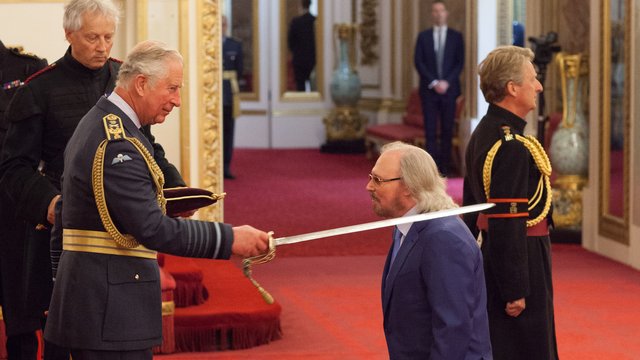
On a quiet morning in June 2018, Barry Gibb walked through the gates of Buckingham Palace — not as the last surviving Bee Gee, nor simply as a global music icon. He walked in as a man who had carried the weight of family, fame, grief, and survival for more than five decades. By the end of the ceremony, he emerged not just as Barry Gibb, but as Sir Barry Gibb — knighted by Prince Charles, with a tap of the sword and a whisper of destiny fulfilled.
But the story of that moment is far deeper than a royal title. It is the story of a boy with a secondhand guitar, born into poverty on the Isle of Man in 1946, whose falsetto would one day help define the sound of an era. It’s the journey of a family that rose from street corners to global superstardom — and then fell, one tragedy at a time, until only one brother remained.
The Humble Roots of a Pop Dynasty
The Gibb family’s early years were far from glamorous. Music was their lifeline — not a luxury, but a survival tool. In the working-class streets of Manchester, Barry, Robin, and Maurice sang for coins, their harmonies already haunting, impossibly tight. By 1958, they’d immigrated to Australia, carrying nothing but dreams. It was there the Bee Gees were truly born.
Barry’s songwriting, even then, was years ahead of his age. By the mid-1960s, they had returned to England, storming the charts with hits like “New York Mining Disaster 1941”, “Massachusetts”, and “To Love Somebody.” Barry was no longer just a hopeful teenager — he was a composer of anthems, a leader among legends.
The Disco Reign — and the Fall That Followed
If the Bee Gees’ 60s catalog established them, the 70s crowned them kings. With Saturday Night Fever, Barry’s falsetto didn’t just break records — it reshaped pop culture. “Stayin’ Alive,” “Night Fever,” “How Deep Is Your Love”—these weren’t just songs, they were declarations. Disco wasn’t a genre. It was the Bee Gees.
But fame is fickle. By the early 80s, disco’s glitter had tarnished. In the infamous 1979 “Disco Demolition Night,” Bee Gees records were torched in protest. The same voices that ruled radio were now silenced. To many, their reign was over.
Barry, however, refused to fade. If the Bee Gees name was tainted, his melodies were not. He wrote “Islands in the Stream” for Dolly Parton and Kenny Rogers, “Guilty” for Barbra Streisand, and “Chain Reaction” for Diana Ross. His fingerprints were everywhere — even if his name wasn’t.
Loss After Loss: A Brother’s Grief
Fame couldn’t protect the Gibb family from heartbreak. Andy, the youngest, died at 30 in 1988. Maurice, the steady anchor, died suddenly in 2003. Robin, Barry’s twin in harmony and contrast in spirit, passed in 2012. With each loss, Barry carried more than grief. He carried their legacy.
He once admitted, “Sometimes I wonder if it would have been better if we’d never been famous.” Those words carried the ache of survivor’s guilt, of a man who had everything — except the brothers who gave it to him.
A Knighthood for All of Them
So when Barry Gibb was knighted in 2018, it was not a solo victory. In his heart, he brought Andy, Maurice, and Robin with him. He stood tall, but not alone.
Inside the palace, the ceremony was steeped in tradition. As Prince Charles raised the sword and said, “Arise, Sir Barry Gibb,” the moment echoed with more than royal pomp. It was a recognition not just of musical achievement, but of resilience. Of survival. Of love.
“I will carry it for all of us,” Barry said later. And in that one sentence, he captured everything: a life built not just on talent, but on loyalty, loss, and the unbreakable bond of brotherhood.
The Legacy of a Knight
Barry Gibb’s story isn’t just a music biography. It’s a parable of persistence — how one man held the flame when the world tried to blow it out. From singing on the streets of Manchester to redefining pop with falsetto, from being mocked in the disco backlash to watching three brothers pass before him — Barry never gave in.
His knighthood was not the end. It was the acknowledgment — that the music mattered, the love endured, and the story would never be forgotten.
Sir Barry Gibb didn’t just carry on the Bee Gees legacy.
He became it.